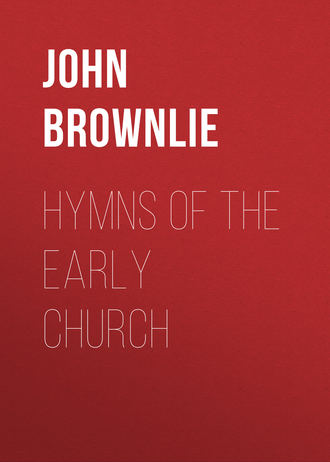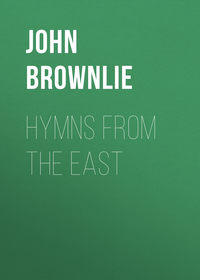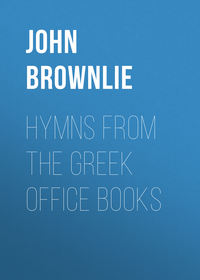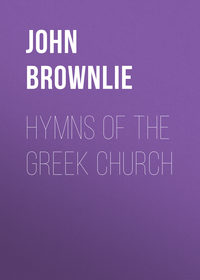 полная версия
полная версияHymns of the Early Church
Author unknown. Belonging, according to Mone, to the thirteenth or fifteenth century.
ISee, sweet soul, my sister dear,Now the bridegroom neareth;Haste, prepare a place for HimWho in love appeareth.IISoon He comes, a gentle guest,Comes with heart o’erflowing;All the best that heaven affordsIn His love bestowing.IIIWhere His gracious presence isThere is joy unending;Blessing with His friendship comes,Every bliss transcending.IVYea, He comes to rest awhile,Thee with love entwining;At thy board He’ll take His place,By thy side reclining.VUp, my soul, to meet thy Spouse;Hark! His footfall sounding;In thy bosom He will dwellWith His love abounding.VIHold Him fast in fond embrace;Say thou’lt leave Him never,Till the blessing of His loveRest on thee for ever.O ESCA VIATORUM
Ascribed by some to Thomas Aquinas, but believed by latest and best authorities to have been composed by some unknown German Jesuit of the seventeenth century. It has not been traced further back than the Mainz Gesang-Buch of 1661, where it is styled “Hymn on the true Bread of Heaven.”
IO Food for pilgrims pining!O Bread for angels shining!O Manna fresh from heaven!In bountiful completeness,O may Thy heavenly sweetnessTo hungering hearts be given.IIO Font of love surprising,From Jesu’s heart uprising!A pure refreshing flow;Nought else our thirst allayeth —For this the pilgrim prayeth —This draught of love bestow.IIIThy face we come revering,O Jesus, now appearingIn sacramental rite.O when in heaven, before itUnveiled, may we adore it,Our faith absorbed in sight.JESU, DULCEDO CORDIUM
In the Paris Breviary of 1736, this is the hymn for Lauds for the festival of the Transfiguration. It is composed of six stanzas of the Gospel Rhythm of St. Bernard, beginning, Jesu, dulcis memoria, the fourth stanza of which begins, Jesu, dulcedo Cordium.
IJesu, delight of every heart,Thou font of life, Thou source of light,Earth can no joy so real impart,No soul can form a hope so bright.IIAbide with us, O Lord, we pray,And cause Thy heavenly light to glow;Drive from our minds the clouds away,And let the world Thy sweetness know.IIIWhen Thou dost seek the humble heart,Thy heavenly truth is freely given;Then vanities of earth depart,Then glows the fervent love of heaven.IVO Jesus, of Thy wondrous grace,Make us Thy boundless love to know;And when we see Thee face to face,To us Thy matchless glory show.VThey know how sweet the Lord can be,Who deeply drink His love divine;How blest, who find their all in Thee,Nor thirst for other joys than Thine.VIO Thou the spring whence pity flows!Light from the Fatherland to cheer!To us Thy glorious light disclose,Nor let dark clouds afflict us here.VERBUM SUPERNUM PRODIENS
By St. Thomas of Aquino, the Angelical Doctor. Born about 1225-1227; educated in the Benedictine monastery at Monte Cassino, and at the University of Naples. Having resolved to become a Dominican friar, St. Thomas, after much opposition from his family, took the vows of obedience, celibacy, and poverty at Naples, in 1243. The remainder of his life was spent in the service of the Church at Paris, Cologne, Rome, Naples, Bologna. When on his way to attend the Second Council of Lyons, he died in the Benedictine abbey of Fossa Nuova, in the diocese of Terracina, in 1274. This hymn was written about 1263 for the office for use on Corpus Christi. It is found in the Roman, Mozarabic, York, Sarum, Aberdeen, Paris, and other Breviaries, its primary use being at Lauds in Corpus Christi.
IThe Word, proceeding from above,Yet still at God’s right hand in heaven,Came to His work impelled by love,And soon life’s day declined to even.IIA traitor in His chosen bandBetrays his Lord to death and grave;But ere He died, with His own handHimself as food to man He gave.IIIIn double form the gift was made;He gave them of His flesh and blood,That so the feast His love purveyed,Might prove for man sufficient food.IVBy birth a friend in Him we find;As food He fills the festal board;In death the ransom of our kind;In heaven He is our great reward.VO Saving Sacrifice! that madeThe gates of heaven stand open wide,Be Thou our strength, come to our aid,When foes would crush on every side.VITo Thee, Good Shepherd, who for meatDost give Thy flesh to feed Thine own,To Father, and to Paraclete,Be praise through ages yet unknown.Death and Judgment
GRAVI ME TERRORE PULSAS
By Peter Damiani. Born at Ravenna about 988; became a “religious” of the order of the Monks of the Holy Cross of Fontavellano, of which community he subsequently became the Superior, founding in his day five monasteries under the same rule; was induced by Pope Stephen IX. to accept the position of Cardinal-Bishop of Ostia, an office he was allowed to resign by Pope Alexander II. in 1062. In retirement he lived a life of great asceticism and self-mortification. On his return journey from Ravenna, whither he had gone as Papal legate on a mission of inquiry and reform, he died of fever at Faenza, in the monastery of Our Lady, 1072.
ITerror grim the soul oppressesWhen the day of death is near;Sighs the heart, the reins are sundered,Quakes each part with anxious fear;While the mind the woe detailethOf the conflict to appear.IISpectacle all woe inspiringWho its terror can pourtray?See, the course of life is ended,And the sickening flesh gives way,For the wrestling soul in triumphBreaks the bands that bid her stay.IIISense decays, and fails expression;Dark the world to melting eye;And the troubled breast in anguish,Gasping, breathes her burdened sigh;Grace of form and glow of beauty,From the withering body die.IVThoughts, and words, and deeds forgotten,Crowd around in grim array;And unwilling eyes behold them,Be they closed or turned away;In the heart they seem to rankle,Turn he wheresoe’er he may.VVain the vow of new obedience —Time for vowing is no more;Vain the sorrow of repentance,For the day of grace is o’er;Conscience now the tortured sinnerGnaws with pangs unfelt before.VIDraughts of sweet deluding pleasureGive the bitter dregs at last;Come, unending pain and anguish,With the short-lived rapture past;Then, what once appeared so worthy,Is aside as worthless cast.VIIThen, O Christ, Thou King victorious,Come with succour in my plight;When the soul is freed from bondage,In its hour of darkest night;Come, O Christ, Thy help extending,Free me from the accuser’s might.VIIIHeadlong may the Prince of DarknessWith the hosts infernal fall!Thou, the Shepherd of Salvation,Bid me follow at Thy call,To the land where fulness dwelleth,And those eyes shall see it all.APPROPINQUAT ENIM DIES IN QUA JUSTES ERIT QUIES
A cento taken from the hymn, Heu! Heu! mala mundi vita, published by Du Mévil in 1847, from a MS. of the twelfth century, in the National Library at Paris. The poem from which the cento is taken consists of nearly four hundred lines, and the cento begins at line 325.
ILo, the day, the day approachethWhen the just shall rest in peace,When the patient souls shall triumph,And the vile from troubling cease.IIDay of life, who can abide it?Day of light, unseen before;Death, the fell destroyer, dieth,Night and darkness are no more.IIISee He comes whom ages longed for —Long expected King of kings —Now He tarries not, and with HimAll His great salvation brings.IVO how blessed! O how joyful!O what sweetness it shall be!When the eyes of those who loved HimShall their Lord and Master see.VJesus then with sweet affection,And in tones of tenderest love,Shall invite His faithful peopleTo the joys prepared above.VI“Ye who held My truth unsullied,Faithful stood in world of sin,Suffered for the name ye honoured,See the joys ye sought to win.VII“See the heavenly kingdom promised,Long reserved, but now revealed;Now behold it, now possess it,Now the princely sceptre wield.”VIIIO how sweet our earthly losses,In the midst of gain like this!O how vain the world’s possessions,At the cost of so much bliss!IXO how blessèd then the mourners,Who for Christ earth’s sorrow bore,By a scornful world neglected!They shall reign for evermore.XNow no terror grim shall haunt them —Tears and sorrows are no more;Grinding want shall ne’er afflict them,Crippled age nor weakness sore.XIPeace eternal there abideth,Hearts with festive gladness bound;There is youth with perfect vigour,And with bloom unfading crowned.XIIO just Judge! in boundless mercyCall me heavenward by-and-by,For my soul is faint with longing,And I wait with tearful eye.Heaven
JERUSALEM LUMINOSA VERÆ PACIS VISIO
The second in a group of three hymns, of all which the author is quite unknown. First published by Mone from a fifteenth century MS., at Karlsruhe. This hymn has for title in the original, De Gloriâ Cœlestis Jerusalem quoad dotes Glorificati Corporis– “Of the Glory of the Heavenly Jerusalem, so far as concerns the endowments of the Glorified Body,” and was a favourite at dedications and other festivals. All the three of the series will be found, with English renderings, in Dr. Neale’s “Hymns, chiefly Mediæval, on the Joys and Glories of Paradise.”
IO city girt with glory!Thou scene of quiet rest,Where dwells the King Eternal —O beautiful and blest!Thy streets are filled with glorious song,The praises of a myriad throng.IIWith stones of polished beautyIs reared thy structure fair;And gems, and gold, and crystalAre sparkling everywhere;With pearls thy gates are glittering gay,And golden is thy bright highway.IIIFor ever and in sweetnessAre Alleluias given;Unending is the feast day,The royal feast of heaven;Whate’er within thy walls is stored,Is pure and holy to the Lord.IVNo clouds with sombre curtainThy glorious brightness screen;There shines the Sun Eternal,And aye at noonday seen;There is no night to give repose,For no one toil or trouble knows.VThe vernal glow of springtimeIs bright and lasting there,The wealth of summer’s richnessIs scattered everywhere;And that fair realm can never knowThe autumn’s blast or winter’s snow.VIThe notes that fall in sweetness,Where birds in woodland sing;The sounds of softest music,That winds in summer bring,Are wafted o’er that city bright,In strains of unalloyed delight.VIIThere youth adorned with vigourNe’er into age declines;No aged fears the mortal,Nor for the past repines;For past and future are unknown:The present reigns in heaven alone.VIIINo fleshly law can triumph,And over reason ride;With bodies pure and stainlessThe spirit shall abide;And power of flesh, and power of will,Shall both one common law fulfil.IXO bright the heavenly glory,This fragile frame shall wear,When health, and strength, and freedomShall crown with beauty rare;And pleasure’s draughts no sorrow know,But everlasting joys bestow.XNow gladly bear the burden;With zeal thy task maintain,And gifts shall crown thy labour,And all thy loss be gain,When decked with splendour thou shalt be,Where glory dwells eternally.URBS BEATA HIERUSALEM
The author of this fine old rugged hymn is unknown. It is conjectured to be of sixth- or seventh-century date. It passed into many mediæval Breviaries, sometimes entire, but often divided into two parts. It was largely used for the dedication of churches.
Part IIO vision bright of heavenly peace,Jerusalem on high,With living stones Thy walls are built,All beauteous to the eye;A high-born bride, the angels standAround Thee, an attendant band.IIFrom heaven she cometh down preparedHer nuptial hour to grace;With jewels decked she shall be ledTo see her Bridegroom’s face.O fair her streets, her bulwarks fair,For purest gold is everywhere.IIIHer gates, adorned with glowing pearl,Stand open day and night,And hither come the faithful souls,And enter in His right,For whom they bore the cruel shame,That earth has linked to His dear name.IVAll precious stones and shapely all,By sore affliction made;Each in its place the Heavenly KingWith His own hand has laid —Such was the plan, that with the ElectThe walls of Zion should be decked.Part IIIMost firm the sure foundation stands,And strong the corner-stone,To bear the walls that proudly rise,And bind them into one;And Zion all her trust will layUpon the strength of Christ alway.IIWithin that city, God beloved,Flow streams of praise along;And towers and bulwarks echo forthThe gladness of the song;’Tis praise to God continually,The Three in One, the One in Three.IIIWithin Thine earthly temple, Lord,We meet to seek Thy face;O in Thy loving kindness, hear,Diffuse Thy heavenly grace;Grant, as Thy people humbly bow,Thine ample benediction now.IVBe found of all who seek Thee here,And every need supply —The joys of heaven that cheer the soul,When streams of earth are dry;And in the greatness of Thy love,Hereafter, open heaven above.1
Mone’s Lateinische Hymnen des Mittelalters; Daniel’s Thesaurus Hymnologicus; Tischer’s Kirchenlieder-Lexicon; Trench’s “Sacred Latin Poetry;” Neale’s “Latin Hymns and Sequences,” and “Essays on Liturgiology and Church History;” Duffield’s “Latin Hymn-Writers and their Hymns;” Roundell Palmer’s “Hymns: their History and Development in the Greek and Latin Churches, Germany, and Great Britain;” Julian’s “Dictionary of Hymnology.”
2
Matt. xxvi. 30, ὑμνήσαντες; Acts xvi. 25, ὕμνουν, A. V. – “Sang praises unto God;” R. V. – “Were … singing hymns unto God.”




